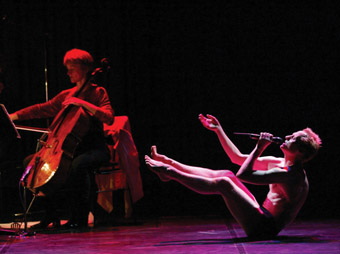 |
Nigel Charnok, Fever photo Th. Ammerpohl |
Charnok’s collaboration with jazz musician Michael Riessler and the Virus Quartet is a theatre work with three elements: Charnok’s words and movement, Riessler’s music and Shakespeare’s sonnets. Of the three, we get to know Shakespeare least – the sonnets are almost incidental to this one-person riot. Every so often Charnok recites one of them; usually he distracts us at the same time. Only once he admits to the power of the music on stage and removes himself: “this is really beautiful. I shouldn’t be talking. Listen to this.” He sits down in the audience half-way back. The sonnet he recites next is quiet and meaningful, in a way the others haven’t been, because we can’t see him, and he isn’t drawing our attention away.
The disciplined, rich sound of the quintet sometimes provides a middle path between Charnok’s mania and the sonnets’ formality, but it’s not always enough to stave off disorientation. Even Charnok has to remind himself to make the transition sometimes. “Oh, Shakespeare, right”, he says, after a rambling rant on Starbucks and Afghanistan. And then we’re wrenched into “O cunning love, with tears thou leaves me blind” as he hides behind the upstage blacks.
At one level, Fever is a classic introductory text to postmodernism. The work is endlessly self-aware and repeatedly deconstructed. It’s also very funny. Charnock never stops moving as he reminds us that we are an audience, although apparently we’re better than last night’s. Unlike that lot, we’re clearly “a collection of very fine, receptive, elegant human beings.” He lets us in on the music ensemble’s emotional state: “They’re all jet-lagged and I’m in a bad mood,” but assures us “it makes for great art.” Stripping down to near-nudity as the night proceeds, he runs bare-legged, sweaty and disheveled around the stage. More and more deconstructed himself, he exits and comes back on, looking at a polaroid of his own butt, to tell us it isn’t the end of the show but “we’re very near.” Then he refreshes himself from a water bottle, and spits it over the audience.
Much of the deconstructionism is applied refreshingly to modern dance. “I don’t know what the fuck I’m doing,” he says, striking a pose with knees braced together, one arm flung to the side. “Do you have any idea what this means?” After the show, he tells us some of modern dance is “a big con.” Certainly for much of the work he dances the way a child or a drunk might, exuberantly, with a “look what I’m doing now!” spirit to it. We might have been conned, because he makes us watch it, and he calls it art. But we’re happy for a chance not to take modern dance seriously.
The work is modular, with a mix of composed and improvised sections organized according to set cues. Charnok claimed afterward that he and the musicians “ignore each other most of the time,” but the superb clarinettist (Michael Riessler leading the quartet) watched Charnok’s every gesture closely during their duets. Charnok maintains a studied indifference to the work. “It doesn’t really matter. That’s what gives me the total freedom. It’s happening for no one and I’m not there…. I’m really not there.” His attitude can sound disrespectful – to the audience and to the work. But Shakespeare can take it. So can Riessler and so can we. Let’s hope modern dance can too. It if can’t, it’s in trouble.
Drunken party guests aren’t known for their concern for others, but they still work hard for attention. Charnok craves our gaze. He may say what he’s doing doesn’t matter, but maybe he cares more than anyone. Unlike the last, late guest who’s despoiling the furniture and taking polaroids of his body parts, I didn’t want him to leave.
Fever, dance, voice Nigel Charnok, composer, clarinets and saxophone Michael Riessler, Virus String Quartet Willi Lehman, Martin Lehman, Fridtjof Sturm, Enrico Melozzi, technical director Tomek Wozniakowski, lighting Rachel Schipp; Scotiabank Dance Centre, Vancouver, Jan 24-26; PuSh International Festival of Performing Arts, Jan 16 - Feb 3
Anna Russell is a Vancouver writer and filmmaker who is also an analyst with the Canadian Federal Government.
© Anna Russell; for permission to reproduce apply to [email protected]








 back
back